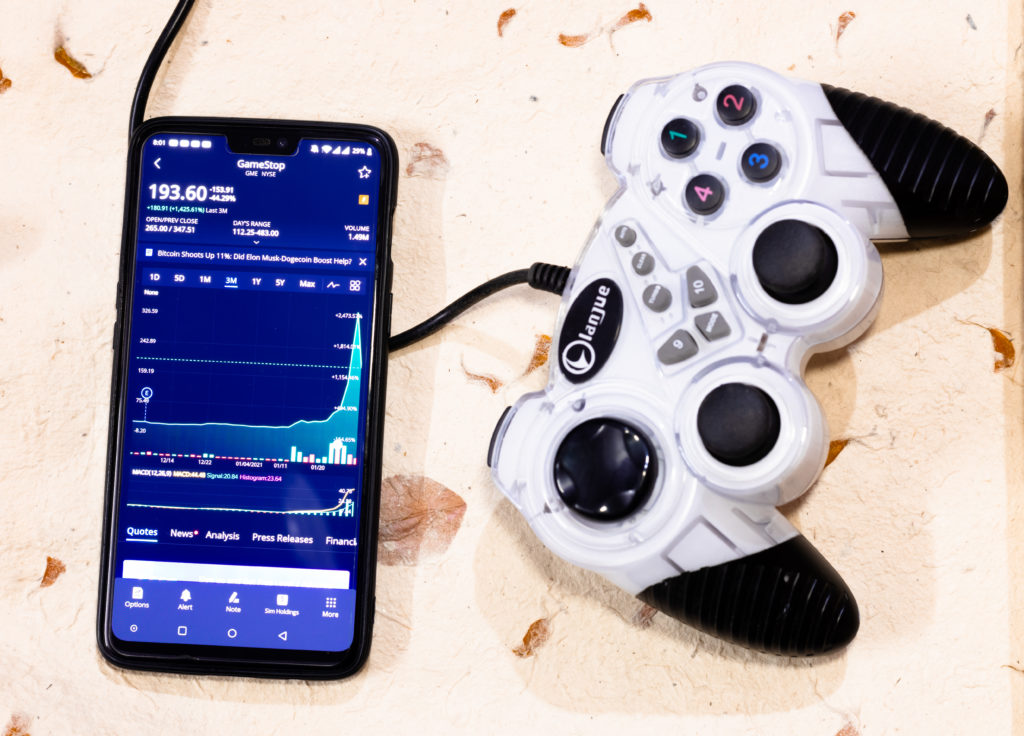
It’s still early in 2021, but here’s a good candidate for stock story of the year.
Shares of GameStop (GME), a video game retailer, had soared recently thanks to a band of traders on the Reddit group WallStreetBets. Though there’s been no significant news out on the company this year, these traders appear to have prompted a massive short squeeze on a stock with a low float that was heavily bet against. As of the end of December, 260% of GameStop’s float been sold short, meaning the average share had been borrowed 2.6 times. The overwhelming majority of investors were betting on the stock to go down. However, the skyrocketing share price forced many of those traders to buy back the stock, helping to propel the rally.
How Did GameStop Rise 2,500%?
The first thing you need to know about GameStop is that it’s been struggling for several years. The retailer buys and sells old video games, which has been tough as gaming has gone digital. COVID-19 only made things worse.
As recently as August, those shares that briefly spiked to $469.42 earlier this month were trading for less than $5. At their low point during the pandemic, GameStop shares sold for $2.57 apiece. The short-lived highs represented an increase of more than 18,500% compared to their bottom, less than a year ago.
GameStop shares started surging in the final months of 2020. Some people were optimistic for a number of reasons, including a new partnership with Microsoft and Chewy co-founder Ryan Cohen’s announcement that he’d acquired a 9% stake. GameStop stock closed out 2020 at $18.85 a share. Thursday’s short-lived highs represented a 2,500% increase in less than a month.
Factoring In Short Sellers
This brings us to the second thing you need to understand about what’s up with GameStop stock, which is how short selling works.
When you short a stock, you’re essentially borrowing it without really buying it, betting it will go down. That’s what a lot of big institutional investors started doing with GameStop stock.
Suppose Company XYZ’s stock is trading for $50, but you think it’s a loser of a stock. You could simply avoid what you think is a bad investment. But you could also try to make money by shorting XYZ stock. Or at least you could if you were a deep-pocketed Wall Street investor. Most brokerages have pretty strict rules about who’s allowed to take short positions.
If you shorted XYZ, you’d borrow it and then immediately sell it to someone else at $50. Suppose you’re right and the price plummets to $20 a share. You’d then buy back the stock you’d sold for $50, but you’d only pay $20 for it and give it back to the original owner. You’d walk away with $30 profit.
But what if you’re wrong? There’s no limit to how much you can lose. If the stock climbs to $100 or even $1,000? You still have to buy it for $100 or $1,000 and return it to the owner to close out your position.
How Regular Investors Fought Back
That didn’t sit well with a lot of regular investors. Some saw legitimate reason to invest in the stock, including the addition of three prominent board members, one of whom is Chewy’s Cohen. But plenty were simply fed up with Wall Street and its reputation for looking down on ordinary investors — or “retail investors” in stock market parlance.
Some joined together, many using a reddit group called WallStreetBets, to deliberately drive up the price by buying more and more of the stock. It’s called a “short squeeze.” Stocks issued by other troubled companies, like AMC Theatres and Blackberry, experienced a similar phenomenon this week.
Remember: When you’re holding a short position in a stock, you can lose an unlimited amount of money in theory. If you’d shorted a stock and it kept shooting up, you’d probably panic and scramble to buy shares as quickly as possible before they possibly soar even higher.
Hedge fund managers aren’t that much different from you and me in that respect: They also rushed to close out their positions. The cost of betting against GameStop? More than $5 billion, according to some estimates. Another thing you need to know about GameStop in February 2021, is that whatever you experienced a week or two ago is already completely out of date.
3 Lessons Investors Can Learn From GameStop
Watching the GameStop saga play out has certainly been drama filled. But as much as this may feel like a win for the little guy, let’s not forget that in “teaching” a few mega-rich hedge funders a lesson, a lot of average people also lost money as this roller coaster unfolded. Here are three takeaways for the rest of us:
Has anything truly changed about GameStop’s value?
Some traders were able to make huge profits on GameStop’s meteoric rise. But despite all the unbelievable price swings, absolutely nothing has changed about the company’s actual value. It’s still struggling with the shift to digital gaming and remains deeply in debt.
When you buy stock in a healthy company, share prices will rise and fall. But short sellers and Reddit users likely won’t be able to drive the wild price swings we’ve seen.
Buying speculative stocks is often quite risky
In case the unbelievable 2,500% returns you could have achieved in less than a month have piqued your interest, take a step back. That would require the ability to perfectly predict the market, something absolutely no one can do.
Before you scour a list of penny stocks in hopes of finding the next GameStop to make a quick profit off of, consider the far more likely outcome of losing most of your investment.
Getting rich should be somewhat boring
Ask anyone who’s built wealth and wasn’t born rich, how they did it. They probably won’t tell you a story about taking short positions or buying $2 stocks.
Most likely they’ll tell you that they started investing early. They’ll stress consistency and long-term investing over day trading. And no matter how they feel about Wall Street, they’d no doubt tell you NOT to make investing decisions based on emotion.
What Should I Do?
One of the best ways for investors to handle volatility and the uncertainties of the future is by utilizing a diversified portfolio tailored to their goals, values and risk tolerance. The team at Demand Wealth is passionate about helping clients achieve their financial goals. We individually assess your unique financial circumstances and develop strategies that are customized to your needs.
Stock predictions are hard! That’s why it’s important to avoid the temptation to over-focus on the short term and ever present chat room hype and media headlines. Instead, construct a sound financial plan with a Demand Wealth advisor that addresses your longer term needs, goals and dreams. The new year also offers investors a chance to take stock of how they handled the unexpected events of the past 12 months and consider making changes.
Are you interested in aligning your lifestyle with a diversified investment strategy to navigate the future? If so, we are here to help! Open an account here or schedule a Zoom conference with one of our advisors today.
This report is a publication of Demand Wealth. Information presented is believed to be factual and up-to-date, but we do not guarantee its accuracy and it should not be regarded as a complete analysis of the subjects discussed. All expressions of opinion reflect the judgment of the author as of the date of publication and are subject to change.
